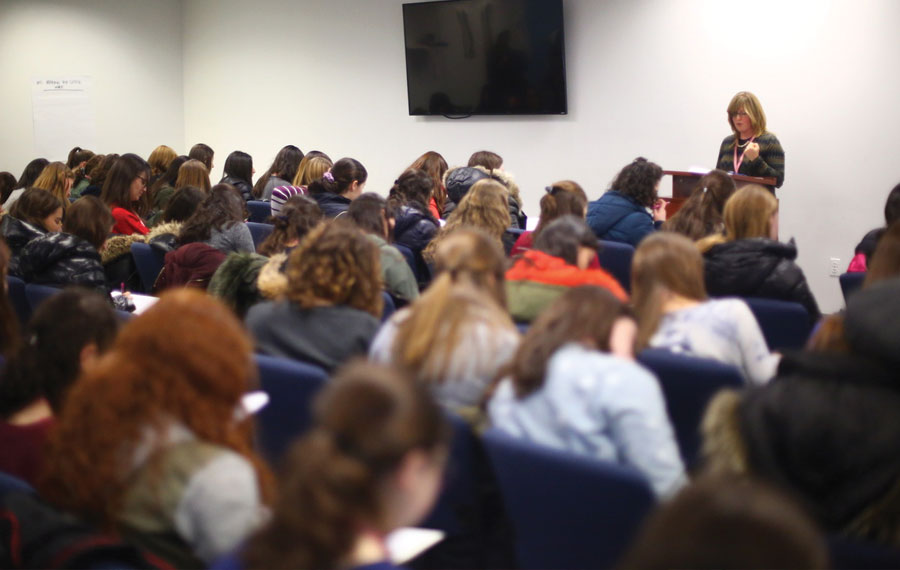 Photos courtesy of Joshua Steinreich
Photos courtesy of Joshua Steinreich In Orthodox synagogues on Shabbat and holiday mornings, men are called up to the Torah, while the women sit in a separate area divided by a “mechitzah.” This can be a challenge for some women, who wish to be more involved.
And so, the Orthodox Union created a Simchat Torah program specifically for women. Now in its second year, the OU partners with more than 40 Orthodox congregations throughout the United States and one Canadian province to offer women-led lectures on Simchat Torah morning. The women giving the talks are typically rebbetzins or teachers in their communities.
“By creating this Torah time slot, it affords women the opportunity to be engaged and connected and inspired on Simchat Torah,” OU Women’s Initiative Founding Director Rebbetzin Adina Shmidman told the Journal. “It’s a wonderful timeslot to capitalize on because women don’t have a destination within the synagogue experience. It’s affording women within the community a positive, inspiring moment where they can participate purposefully.”
Each synagogue that participates chooses a woman (or multiple women) to speak for 35 minutes to an hour, however long it takes for the men to be called to the Torah.
In Los Angeles, three synagogues — Young Israel of Century City (YICC), LINK Kollel in Pico-Robertson and the Shul on the Beach in Venice — are participating this year. While YICC and LINK have taken part before, the Shul on the Beach, featuring speaker Emunah Fialkoff, is a new addition.
In her shiur, Fialkoff said she will be talking about the process of teshuvah, and how in the last few parshiyot of the Torah, we are repeatedly told how the Jews are going to sin and return.
“I want to explore what that process of return is supposed to look like and how we can practically accomplish it in our own lives,” she said.
“Our shiurim on Simchat Torah provide an important and exciting opportunity for women to experience the joy of Torah that we are celebrating on that day.” — Geraldine Wiener
Although Fialkoff acknowledged that all Torah learning programs are crucial, whether men or women deliver them, Simchat Torah presents a special opportunity “because women typically have fewer ways to feel engaged during this holiday. And because women play such a crucial role in their family and in their communities, I think it’s important not to overlook women’s need for Torah study and inspiration. Every person needs a connection to Torah. A women’s initiative helps ensure that the Torah has a farther reach.”
Geraldine Wiener, a teacher for the Orthodox Union’s Women’s Torah Network, L.A., will be giving a lecture at YICC, where she has been a longtime member. She’s been teaching women at the synagogue for 20 years on Simchat Torah in a program that Rabbi Elazar Muskin started. More than 60 women usually her attend her sessions. This year, her lecture will focus on learning about the holiday season.
“Our shiurim on Simchat Torah provide an important and exciting opportunity for women to experience the joy of Torah that we are celebrating on that day,” she said. “We always connect the texts that we learn to ethical lessons that guide us into the New Year.”
The OU’s Simchat Torah program is one of many women-driven initiatives the organization hosts throughout the year. There is a monthly Rosh Chodesh virtual lunch-and-learn featuring women speakers; a women-led learning series at synagogues between Pesach and Shavuot; ALIT — a four-week Torah learning program for women in Jerusalem; and a professional development seminar for mikveh attendants and administrators.
“We are hopeful we will continue to elevate programming for women and transform challenges into opportunities,” Shmidman said.
With their Simchat Torah initiative in particular, Shmidman said it’s vital that women are recognized in their communities.
“Women add a lot to the synagogue dynamic,” she continued. “Their voices, their insight and their perspective are extremely valuable and it’s important that they have an impact and that they are engaged.”
She added that the feedback from last year’s participants was that the women appreciated having a class to attend on the holiday, and attendance was higher than expected.
“I hope women are inspired, and that they will join future programs that we have,” she said. “I hope that women will walk away from Simchat Torah feeling engaged and involved and that the holiday presents a very positive experience for them.”























 More news and opinions than at a Shabbat dinner, right in your inbox.
More news and opinions than at a Shabbat dinner, right in your inbox.